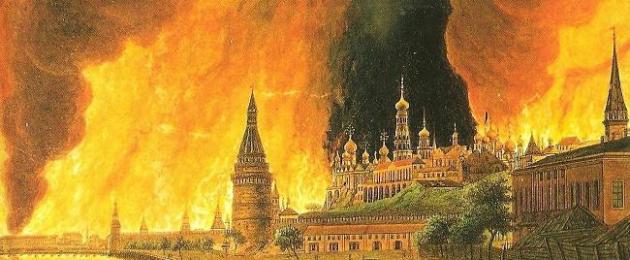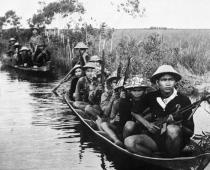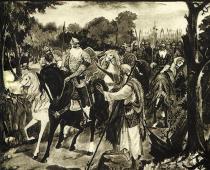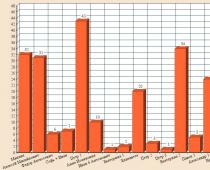The military events of the Patriotic War of 1812 took place on the territory of Russia between it and France. The reason was the refusal of Alexander I to support the continental blockade, which Napoleon wanted to use as the main weapon against Great Britain. In addition, the policy of France in relation to the states of Europe did not take into account the interests of the Russian Empire. And as a result, the Patriotic War of 1812 began. You will learn briefly but informatively about military operations from this article.
Background of the war
As a result of the defeat of the Russian army in the Battle of Friedland in 1807, Alexander I concludes the Treaty of Tilsit with Napoleon Bonaparte. By signing the treaty, the head of Russia was obliged to join the continental blockade of the United Kingdom, which, in fact, contradicted the political and economic interests of the empire. This world has become a shame and humiliation - this is what the Russian nobility thought. But the Russian government decided to use the Peace of Tilsit for its own purposes in order to build up forces and prepare for war with Bonaparte.
As a result of the Erfurt Congress, the empire took Finland and a number of other territories, and France, in turn, was ready to capture all of Europe. The Napoleonic army, after numerous annexations, significantly approached the border of Russia.
the Russian Empire
The causes of the Patriotic War of 1812 on the part of Russia are primarily economic. The conditions of the Peace of Tilsit dealt a significant blow to the finances of the empire. For a clear example, let's give a number of figures: before 1807, Russian merchants and landowners exported 2.2 million quarters of bread for sale, and after the contract - only 600 thousand. Such a reduction led to a drop in the value of this product. At the same time, the export of gold to France in exchange for all kinds of luxury goods is growing. These and other events led to the depreciation of money.
The territorial causes of the Patriotic War of 1812 are somewhat confusing due to Napoleon's desire to conquer the whole world. 1807 went down in history as the time of the creation of the Grand Duchy of Warsaw from the lands that belonged to Poland at that time. The newly formed state wanted to unite all the territories of the Commonwealth. To fulfill the plan, it was necessary to separate from Russia part of the lands that once belonged to Poland.
Three years later, Bonaparte seizes the possessions of the Duke of Oldenburg, who was a relative of Alexander I. The Russian emperor demanded the return of the lands, which, of course, did not follow. After these conflicts, talk began to emerge of signs of a coming and imminent war between the two empires.
France
The main reasons for the Patriotic War of 1812 for France were an obstacle to international trade, as a result of which the state of the country's economy deteriorated markedly. In essence, Great Britain was the main and only enemy of Napoleon. The United Kingdom seized the colonies of such countries as India, America and, again, France. Given that England literally reigned at sea, the only weapon against her would be a continental blockade.
The reasons for the Patriotic War of 1812 also lie in the fact that, on the one hand, Russia did not want to break off trade relations with Great Britain, and on the other hand, it was necessary to fulfill the conditions of the Tilsit Peace in favor of France. Finding himself in such a dual situation, Bonaparte saw only one way out - military.
As for the French emperor, he was not a hereditary monarch. In order to prove his legitimacy in possession of the crown, he made an offer to the sister of Alexander I, which he was immediately refused. The second attempt to enter into a family union with the fourteen-year-old Princess Anna, who later became Queen of the Netherlands, also failed. In 1810, Bonaparte finally marries Mary of Austria. This marriage gave Napoleon reliable rear protection in the event of another war with the Russians.
The double refusal of Alexander I and the marriage of Bonaparte to a princess of Austria led to a crisis of confidence between the two empires. This fact was the first reason for which the Patriotic War of 1812 occurred. Russia, by the way, itself prompted Napoleon to the conflict with its further controversial actions.
Shortly before the start of the first battle, Bonaparte told the Warsaw ambassador Dominique Dufour de Pradt that supposedly in five years he would rule the world, but for this it remained only to “crush” Russia. Alexander I, constantly fearing the restoration of Poland, pulled several divisions to the border of the Duchy of Warsaw, which, in fact, was the second reason that started the Patriotic War of 1812. Briefly, this can be formulated as follows: such behavior of the Russian ruler was perceived by the French emperor as a threat to Poland and France.

Further development of the conflict
The first stage was the Belarusian-Lithuanian operation, covering June-July 1812. At that time, Russia managed to protect itself from encirclement in Belarus and Lithuania. Russian troops managed to repel the onslaught of the French in the St. Petersburg direction. The Smolensk operation is considered the second stage of the war, and the march on Moscow is the third. The fourth stage is the Kaluga campaign. Its essence was the attempts of the French troops to break through in this direction back from Moscow. The fifth period, which ended the war, fell on the displacement of the Napoleonic army from the territory of Russia.
Start
On June 24, at six in the morning, the vanguard of Bonaparte's troops crossed the Neman, reaching the city of Kovno (Lithuania, modern Kaunas). Before the invasion of Russia, a considerable grouping of the French army of 300 thousand people was concentrated on the border.
As of January 1, 1801, the army of Alexander I numbered 446 thousand people. As a result of recruitment, at the time of the outbreak of the war, the number increased to 597 thousand soldiers.
The emperor addressed the people with an appeal for volunteer mobilization for the protection and defense of the Fatherland. In the so-called people's militia, everyone had the opportunity to join, regardless of the type of activity and class.

Battle of Borodino
The largest battle took place on August 26 near the village of Borodino. More and more researchers are inclined to believe that the battle took place over 3 days (from August 24 to 26). In fact, this event marked the beginning of the defeat of Bonaparte's army.
In the battle, 135 thousand Frenchmen met with the 120 thousandth army of Alexander I. The Russian army lost 44 thousand, Napoleon lost 58 thousand people. During the battle, the army under the command of Bonaparte managed to capture the positions of the Russians, however, at the end of hostilities, the French had to retreat to the previously occupied lines. Thus, it is generally accepted that Russia won this battle. The next day, Commander-in-Chief M.I. Kutuzov ordered a retreat due to heavy human losses and Napoleon's reserve troops rushing to help the French.
In 1839, for the first time, a reconstruction of the events of the Battle of Borodino was created, which was carried out by Nicholas I. There were 150 thousand soldiers on the Borodino field. The centennial anniversary was celebrated no less richly. The film archive has preserved a small number of footage of the chronicle, as Nicholas II bypassed the line of soldiers who participated in the reconstruction.

Result
The battles of the Patriotic War of 1812 lasted from June 24 to December 26 (according to the new style). And they ended with the complete destruction of the Great Army of Bonaparte, which included soldiers of Prussia and Austria. On December 21, according to the official Hans Jacob von Auerswald, only a small part of the French soldiers returned back, and even those were in a terrible state. A little later, some of them died from multiple diseases and wounds already in their homeland.
The results of the Patriotic War of 1812 cost Napoleon 580 thousand people and about 1200 guns. Historian Modest Bogdanovich estimated the losses of the Russian troops at 210,000 militiamen and soldiers. In 1813, the War of the Sixth Coalition begins, in which European states fought against the plans of Napoleon and his allies. In October of the same year, Bonaparte was defeated in the battle of Leipzig, and in April of the following year he renounced the French crown.

Defeat of France
The reasons for the failure of Napoleon's plans were as follows:
An important role was played by Kutuzov's military endurance and the political will of Alexander I;
A large number of patriots among the common people and the nobility, who donated their material resources to the maintenance of the Russian army and their lives for the sake of victory;
Persistent and stubborn guerrilla warfare, in which even women took part.
Command
The heroes of the Patriotic War of 1812 did everything possible to prevent the French from conquering the Russian land, thanks to which they won a well-deserved victory. Without the selflessness of the people and the wisdom of the commanders, Emperor Alexander I would have lost this battle.
Among those who fought, such names stand out as M. I. Golenishchev-Kutuzov, S. Volkonsky, M. B. Barclay de Tolly, D. Golitsyn, D. S. Dokhturov, I. S. Dorokhov, P. Konovnitsyn, D. P Neverovsky, D. V. Davydov, P. I. Bagration, M. I. Platov, A. I. Kutaisov, A. P. Ermolov, N. N. Raevsky, P. Kh. Wittgenstein and others.
But the main fighter against Napoleon's aggression was the ordinary Russian people. The victory in the Patriotic War of 1812 belongs to the voluntarily mobilized population, which withstood all the hardships of the unprecedented war. Many award documents testify to the mass heroism of the soldiers. More than four dozen officers were personally rewarded by Kutuzov with the Order of St. George.

The human losses of France and Russia
The data below was published by the historian S. Shvedov on the 175th anniversary of the end of the battle. The history of the Patriotic War of 1812, written by different researchers of the theater of operations, has significant differences in the issue of human losses.
On average, we can confidently say that the number of victims of the war on the part of Russia reached 300 thousand, most of which (175 thousand) were the mobilized part of the population. There are many factors that led to this outcome of events:
Rapid exhaustion of people due to movement over long distances;
Unfavorable climatic conditions;
An urgent need for more water, food and warm clothing;
Diseases and epidemics.
As for France, for her the results of the Patriotic War of 1812 took on a more serious form. The number of French killed is much greater than the Russians. At the beginning of the war, Napoleon's army, which entered the territory of the empire, numbered 480 thousand soldiers. At the end of the war, Bonaparte withdrew from Russia only 20 thousand survivors, leaving about 150 thousand prisoners and 850 guns.

About the title
The course of the Patriotic War of 1812 lasted 7 months. From the first day of the battles, she acquired a movement of a national liberation character from the aggression of Napoleon. The popular trend became the main reason for the victory of the Russian army over the French.
This war was a real test of the cohesion of the Russian people. All estates, regardless of state rank, material and property status, stood up to defend their Fatherland. This is where the name came from. One way or another, all the people who participated in the battles are the real heroes of the Patriotic War of 1812.
● French soldiers never cooked or ate porridge, as the Russians do. Their field cuisine has other traditions.
● There is a lyceum in Russia named after Matvey Platov, ataman of the Patriotic War.
● December 12, 1812, in honor of the victory over Bonaparte, Alexander I proclaimed the forgiveness of those people who helped the French army.
● M. Barclay de Tolly in 1812 created the first military intelligence service in Russia.
- In contact with 0
- Google+ 0
- OK 0
- Facebook 0








